|
|
|
Sort Order |
|
|
|
Items / Page
|
|
|
|
|
|
|
| Srl | Item |
| 1 |
ID:
167115
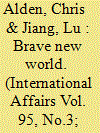

|
|
|
|
|
| Summary/Abstract |
China's ties with Africa are evolving into a multi-faceted relationship of increasing complexity. After nearly two decades of debt-financed infrastructure development, Beijing's exposure to African debt is reaching disquieting proportions with an estimated US$132 billion owed to China in 2016. Managing this new role as Africa's creditor poses uncomfortable questions for creditor and debtor alike. Concurrently, the quiet surge of Chinese investment in manufacturing in Africa is transforming local economies in ways that are beginning to alter the continent's position within the global economy. Finally, the proliferation of Chinese businesses and migrants across Africa is inspiring greater Chinese involvement in UN peacekeeping and private security initiatives.
|
|
|
|
|
|
|
|
|
|
|
|
|
|
|
|
| 2 |
ID:
167108
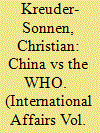

|
|
|
|
|
| Summary/Abstract |
This article studies a conflict over two competing norms in which the actors demonstrated incompatible positions not through arguments, but through actions. During the SARS crisis, China and the World Health Organization (WHO) entered a norm conflict over the precedence of sovereignty or global health security. Both resorted to behavioural, not discursive contestation: while the WHO practically but not rhetorically challenged the sovereignty norm by acting according to the norm of global health security, China—without openly acknowledging it—contravened the basic principles of global health security by acting according to the overlapping sovereignty norm. Why and with what consequences do actors choose to contest norms through actions rather than words? The article accounts for the resort to behavioural contestation by pointing to the strategic advantages it offers for furthering a contentious norm understanding without facing the social costs of making it explicit. It furthermore highlights that behavioural contestation may feed back into and change the odds of discursive contestation as its practical effects provide rhetorical resources to (de-)legitimate one or the other position. The propositions are illustrated in the interactions of China and the WHO during the SARS crisis and the subsequent norm development. This article forms part of the special section of the May 2019 issue of International Affairs on ‘The dynamics of dissent’, guest-edited by Anette Stimmer and Lea Wisken.
|
|
|
|
|
|
|
|
|
|
|
|
|
|
|
|
| 3 |
ID:
167112


|
|
|
|
|
| Summary/Abstract |
The Protection of Civilians (PoC) in peacekeeping and the Responsibility to Protect (R2P) populations from atrocity crimes are two norms that emerged at the turn of the new millennium with the aim of protecting vulnerable peoples from mass violence and/or systematic and widespread violations of human rights. To date, most scholars have analysed the discourses over the status, strength and robustness of both norms separately. And yet, the distinction between the two has at times been exceptionally fine. In this article, we analyse the constitutive relationship between PoC and R2P, and the impact of discursive and behavioural contestation on their joint evolution within the UN system and state practice over three phases (1999–2005; 2006–10; 2011–18). In so doing, we contribute to the International Relations literature on norms by illuminating ideational interplay in the dynamics of norm evolution and contestation. More specifically, we illustrate how actors may seek to strengthen support for one norm, or dimension of a norm, by contrasting it or linking it with another. Our analysis also reveals that while the two norms of R2P and PoC were initially debated and implemented through different institutional paths and policy frameworks, discursive and behavioural contestation has in more recent years brought them closer together in one important respect. The meaning ascribed to both norms—by representatives of states and institutions such as the United Nations—has become more state-centric, with an emphasis on building and strengthening the capacity of national authorities to protect populations. This meaning contrasts with the more cosmopolitan origins of R2P and PoC, and arguably limits possibilities for the external enforcement of both norms through any form of international authority that stands above or outside sovereign states. This article forms part of the special section of the May 2019 issue of International Affairs on ‘The dynamics of dissent’, guest-edited by Anette Stimmer and Lea Wisken.
|
|
|
|
|
|
|
|
|
|
|
|
|
|
|
|
| 4 |
ID:
167107
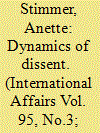

|
|
|
|
|
| Summary/Abstract |
A profusion of international norms influences state behaviour. Ambiguities and tensions in the normative framework can give rise to contestation. While research on norm contestation has focused on open debates about norms, we identify a second type of norm contestation where norms are contested through particular forms of implementation. We therefore distinguish between contestation through words and actions, that is, discursive and behavioural contestation. Discursive contestation involves debates about the meaning and/or (relative) importance of norms. Behavioural contestation, by contrast, eschews such debates. Instead, different norm understandings become apparent in the different ways in which actors shape the implementation of norms. Despite being a potentially powerful mechanism of challenging and changing norms, behavioural contestation has fallen outside the purview of the literature in part because it frequently remains below the radar. The two forms of contestation overlap when the practices of behavioural contestation are brought to the attention of and discussed by the international community. Thus, discursive and behavioural contestation are not mutually exclusive but can happen at the same time, sequentially or independently of each other. This introduction to a special section of the May 2019 issue of International Affairs, on ‘The dynamics of dissent’, develops the concept of behavioural contestation and outlines triggers and effects of this hitherto under-researched expression of dissent.
|
|
|
|
|
|
|
|
|
|
|
|
|
|
|
|
| 5 |
ID:
167114
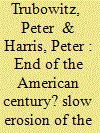

|
|
|
|
|
| Summary/Abstract |
Can the United States continue to shape international politics as it has done for the past 70 years, or is the era of US preponderance coming to an end? Most attempts to answer this question focus on the concept of relative power—that is, the balance of material capabilities between the US and its geopolitical competitors. From this perspective, the ‘American era’ will be over when rival powers are able to muster the military capability to counteract US ambitions on the world stage. In this article, we argue that the most pressing checks on US leadership come not from foreign competitors, but rather from domestic politics. While America's relative power as measured by its military arsenal vis-à-vis those of its rivals has held steady, its ‘usable power’ has declined. We attribute this decline in usable power to three domestic-level factors: the emergence of hyper-partisanship, the absence of a compelling strategic narrative, and the erosion of a social contract of inclusive growth. Our analysis suggests that US leaders will find it difficult to implement a programmatic grand strategy of any description—liberal internationalism, offshore balancing, retrenchment or even President Trump's ‘America First’ strategy—so long as domestic-level dysfunction goes unattended and until usable power is restored.
|
|
|
|
|
|
|
|
|
|
|
|
|
|
|
|
| 6 |
ID:
167109
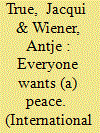

|
|
|
|
|
| Summary/Abstract |
‘Women, Peace and Security’ (WPS) is not just any normative agenda: everyone wants a piece of it. WPS is characterized by unprecedented recognition by states at the United Nations Security Council (UNSC) and the presence of multiple stakeholders, including its own transnational NGO network focused on the first Resolution, 1325. The high degree of participation from civil society in framing the norm from the outset—driving their own access to contestation—makes WPS relatively unique among global normative agendas. It is therefore a good case in which to examine the ‘dynamics of dissent’ and test the effects of discursive and behavioural contestation on normative change. The article seeks to advance the thriving literature on the UN WPS agenda and to further develop the exploratory approach to contestation, which evaluates normative progress based on increased access of all those affected by the norm to practices of norm validation. It maps norm contestation at distinct sites, reflecting a sequence of WPS events referenced at the 2015 UNSC open debate on WPS. It evaluates practices of contestation with regard to affected WPS stakeholders' access to political agency and assesses ‘whose practices’ affect norm change and transformative change in the WPS agenda. The authors conclude that the relative access of the wide range of stakeholders to the different repertoires and constellations of contestation affects the outcomes of WPS. They suggest that scholars should evaluate diverse practices of contestation and identify expanding spaces and choices for a variety of local, national and regional perceptions of gender-equal peace and security. This article forms part of the special section of the May 2019 issue of International Affairs on ‘The dynamics of dissent’, guest-edited by Anette Stimmer and Lea Wisken.
|
|
|
|
|
|
|
|
|
|
|
|
|
|
|
|
| 7 |
ID:
167117


|
|
|
|
|
| Summary/Abstract |
Since 2001 there has been an increase in the use of reserve forces in conflicts sparking a number of organizational transformations when it comes to reserves. In Britain, the Future Reserves 2020 (FR2020) transformation was a cornerstone of recent defence policy. Yet, the scholarly work on military innovations has ignored reserve forces. This article examines why and how the recent attempt to transform the British Army Reserve was undertaken, and analyses its outcome. In doing so, this article contributes a major new case-study to the literature focused on civilian-directed peacetime innovation and the impact of intra-party and intra-service politics upon it. Firstly, we originally examine how intra-party political motivations were the primary initiator of the innovation. Secondly, contrary to previous intra-service rivalry explanations, we argue that our case is a compelling example of intra-service rivalry between components rather than branches, and over manpower and organizational structure rather than technology and visions of victory. Finally, addressing the lack of theory in innovation studies, we show how the transformation followed post-Fordist principles to address its political, ideological and financial drivers. We conclude that numerous innovation processes can be operant at different times, and that FR2020 has been frustrated by the interaction between these processes.
|
|
|
|
|
|
|
|
|
|
|
|
|
|
|
|
| 8 |
ID:
167111
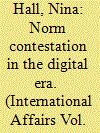

|
|
|
|
|
| Summary/Abstract |
Activists in the internet era are taking action through online petitions, twitter storms and by forming new digital advocacy organizations such as Campact, 38 Degrees and GetUp!. However, no International Relations (IR) scholarship has systematically examined the role of digital advocacy organizations in norm contestation. Digital advocacy organizations warrant study given their international reach, their large memberships, their longevity, their frequent campaigning activity and their claimed impact. This article focuses on the responses of three digital advocacy organizations in Australia, the UK and Ireland to the same external crisis: an increasing number of refugees worldwide. It asks: when and why did these organizations engage in behavioural norm contestation during the refugee crisis? Their use of behavioural contestation is a puzzle, given that digital advocacy organizations have low implementation power. The article draws on interviews with activists and experts, and finds that advocacy groups firstly use discursive contestation (debating the meaning and importance of norms), and then may engage in behavioural contestation (influencing the implementation of norms). Discursive contestation is less costly, and perceived to be less effective, than behavioural contestation. The article suggests that digital advocacy organizations can mobilize people online and offline, and IR scholars should examine this important source of power. This article forms part of the special section of the May 2019 issue of International Affairs on ‘The dynamics of dissent’, guest-edited by Anette Stimmer and Lea Wisken.
|
|
|
|
|
|
|
|
|
|
|
|
|
|
|
|
| 9 |
ID:
167116


|
|
|
|
|
| Summary/Abstract |
After the end of the Cold War the Nordic states gradually began to work together on military issues beyond UN peacekeeping operations, including in NATO operations, on training and education, as well as on armament development and acquisition. Between 2006 and 2013 these efforts reached their aspirational and rhetorical zenith, as the Nordic states agreed in principle to integrate their armed forces closely. The main catalyst was the conviction that small states could no longer maintain balanced and modern military forces on a purely national basis. The core countries in this integrationist experiment were Norway, Sweden and Finland. The integrationist idea soon faced insurmountable difficulties and expensive setbacks, leading to its quiet abandonment by early 2014. At approximately the same time, the Ukrainian crisis caused a change in the Nordic states' perception of Russia, from a difficult partner to a strategic challenger. The need to work together to meet Russia's revisionist challenge in the Nordic–Baltic region produced a resurgence in Nordic defence cooperation, focused on making the Nordic armed forces able to operate together in a crisis rather than full-blown defence integration. Nordic cooperation today serves as a complement to NATO, the EU and enhanced bilateral cooperation with the major Western states.
|
|
|
|
|
|
|
|
|
|
|
|
|
|
|
|
|
|
|
|
|